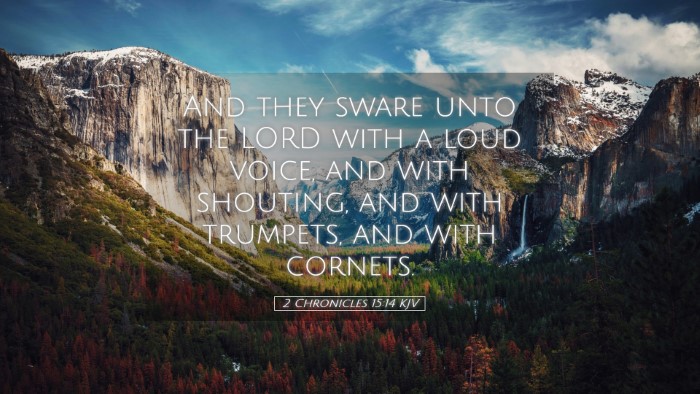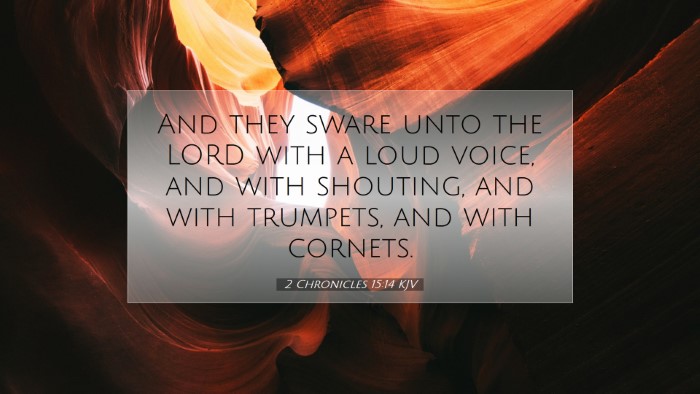Commentary on 2 Chronicles 15:14
Text of 2 Chronicles 15:14 (KJV): "And they swore unto the Lord with a loud voice, and with shouting, and with trumpets, and with cornets."
Introduction
The passage from 2 Chronicles 15:14 depicts a significant moment in Israel's history where the people express their commitment to the Lord. This verse occurs in the context of a national revival under King Asa, who sought to reform the religious practices of Israel and lead the people back to a covenant relationship with God. Such commitments reflect not only individual faith but also collective national identity and purpose in serving Yahweh.
Historical Context
In the backdrop of this verse, Judah faced a period of spiritual decline. King Asa's dedication to purging idolatry and restoring proper worship set the stage for a powerful collective response from the people. Historical insights reveal that Asa initiated reforms to turn away from the previous kings' sinful practices, seeking to align the nation's priorities with God's covenant.
Exegesis of Key Themes
-
Vow and Commitment:
The act of swearing to the Lord signifies a deep, personal, and communal commitment to Him. Matthew Henry notes that the people's vows were not mere formality but a serious undertaking, demonstrating a sincere desire to align their lives with divine will.
-
Joyful Expression:
The loud voices, shouts, and use of musical instruments (trumpets and cornets) highlight an exuberant expression of worship. Albert Barnes emphasizes that such expressions are not only forms of praise but also reflect the people’s emotional and spiritual investment in the moment, indicating genuine repentance and fervent desire for renewed relationship with God.
-
The Role of Public Worship:
Adam Clarke provides insight into the significance of public worship practices during this revival. The collective affirmations of faith serve to strengthen communal ties and solidify the identity of the people as God's chosen ones. This communal aspect not only encourages personal faith but also enhances the spiritual fervor of the entire nation.
Spiritual Insights and Applications
This verse challenges contemporary believers to consider the nature of their commitments to God. The swearing of the people illustrates the importance of sincere devotion and active participation in worship. It raises questions about the depth of our personal and communal commitments to spiritual renewal and the collective pursuit of holiness.
-
Revival in Worship:
The emphatic nature of worship depicted in this passage serves as a reminder of the need for active engagement in spiritual practices, not only in individual devotion but also in corporate worship. It challenges modern congregations to engage with the same enthusiasm and sincerity in their worship.
-
The Call to Repentance:
Just as the Israelites turned away from idolatry, today's believers are called to examine their lives for anything that may be hindering their relationship with God. The process of sincere repentance must be accompanied by vocal and visible acts of commitment to God.
-
Importance of Unity:
The collective response of the people illustrates how unity in faith can spur on a movement of revival. In a similar manner, congregations are called to foster unity in their commitments to God, promoting a culture of mutual encouragement in faith and worship.
Theological Reflections
Theologically, this verse affirms the importance of worship in responding to God's grace and mercy. The act of making a vow signifies an acknowledgment of God's sovereignty and a recognition of human obligation to respond to divine love with love and commitment.
Furthermore, it underscores the historical understanding of covenant theology, where communal vows serve as a means of reminding the people of their shared heritage and duties before God. This collective identity as the people of God enhances the meaning of worship and service in the community.
Conclusion
2 Chronicles 15:14 serves not just as a historical account but as an enduring lesson on the nature of worship, commitment, and unity among God's people. It invites readers—pastors, students, theologians, and Bible scholars—to consider the depth of their own commitment to the Lord and inspires the faithful to cultivate a vibrant, collective expression of worship characterized by sincerity, joy, and mutual encouragement. As we reflect on this passage, may we be reminded that our calls to worship are calls to holistic commitment, rooted in a profound understanding of who God is and what He has done for us.


